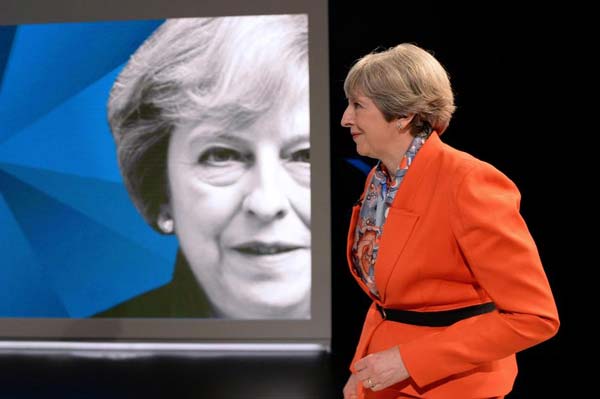May could lose majority in UK parliament -YouGov study in The Times
LONDON - British Prime Minister Theresa May's Conservative Party risks falling short of winning an overall majority of seats in parliament in a national election on June 8, The Times newspaper said on Tuesday, quoting research by polling firm YouGov.
|
 |
|
Prime Minister Theresa May appears on a joint Channel 4 and Sky News general election programme recorded at Sky studios in Osterley, west London, May 29, 2017. [Photo/Agencies] |
In stark contrast to a string of opinion polls that have suggested May's Conservatives will increase their majority, the new constituency-by-constituency modelling by YouGov showed it might lose 20 of the 330 seats it holds and the opposition Labour Party could gain nearly 30 seats, The Times said.
That could leave the Conservatives 16 seats short of the overall majority of 326 needed to govern without the support of other parties, the newspaper said.
May surprised almost everyone in April when she called the snap election, saying she wanted to strengthen her hand for negotiations with the rest of the European Union about Britain's exit from the bloc.
A failure to build on the working majority of 17 that the Conservatives won at the last election in 2015 - against a Labour Party led by radical left-winger Jeremy Corbyn - would be a major blow for May just as she embarks on the Brexit process.
A total of seven polls carried out over the past week have shown May's lead over Labour narrowing, with some suggesting she might not win the landslide predicted just a month ago.
The lead started to contract sharply after she set out plans on May 18 to make some elderly people pay a greater share of their care costs, a proposal dubbed the "dementia tax" by opponents. At the same time, Labour has gone on the attack for cuts to policing which have come into focus after last week's suicide attack in Manchester that killed 22 people.
However, until now no poll has suggested that the Conservatives could lose their majority in parliament.
Sterling weakened against the U.S. dollar after The Times report on Tuesday.
The newspaper, which publishes YouGov's regular opinion polls, said the new election model was based on voting intention data collected over the past week which put support for the Conservatives at 42 percent with Labour on 38 percent, a narrower gap than any recent polls.
YouGov firm acknowledged that its predictions were controversial and that they suggested big swings in the usual voting patterns for many Britons.
But its chief executive, Stephan Shakespeare, told The Times that the model had been tested during the run-up to the EU membership referendum last year when it consistently put the Leave campaign in the lead.
The research allowed for big variations in the outcome of the election, ranging from as high as 345 seats for the Conservatives, 15 more than their current number, to as low as 274, The Times said.
The model was based on 50,000 interviews conducted over a week and allowed YouGov to assess the intention of every type of voter, from where they live to how they voted on Brexit, their age and social background, in order to weight the results.
Shakespeare said the figures could change dramatically before June 8.









